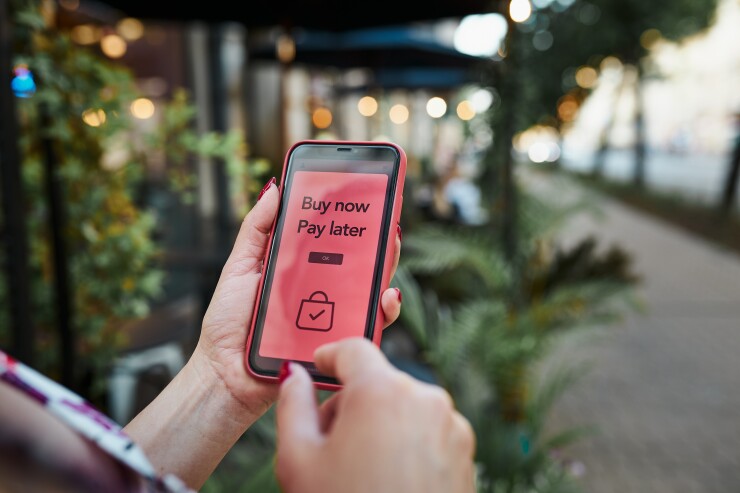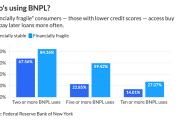
The
Flint, Michigan-based Financial Plus Credit Union is one of the latest credit unions to add a post-purchase
Many smaller credit unions are partnering with vendors to launch BNPL services to compete with incumbent providers such as Affirm and
"BNPL is really becoming a table stakes payment method," Danner said. "Consumers just have an expectation now that you'll have some type of BNPL offering. Even some of the large credit card issuers are doing post-purchase BNPL programs through their credit card programs."
JPMorgan Chase, for example, offers a post-purchase BNPL product called Pay Over Time on credit card purchases, according to the bank.
At Financial Plus, members are offered the option to split the payment after the debit card purchase based on a number of criteria, such as whether the member has direct deposit or is in good standing with the credit union, Kippe said, noting that "99.9%" of members opt for an auto debit for the split payments.
Financial Plus provides the criteria and Equipifi manages the algorithm and authentication.
"We are looking for products and services to ensure that we are serving our community and we're serving the members that we have and are able to attract new members," Kippe said. "Buy now, pay later has evolved and become very popular in recent years, and … it certainly fits right into our product suite and mission."
Roughly 9% of all U.S. consumers used a BNPL service as of fall 2023, representing a 40% increase when compared with the previous two years, according to
Equipifi in 2024 has seen "triple-digit growth in the number of credit unions adopting BNPL services year over year," co-founder and CEO Bryce Deeney said.
Deeney said BNPL represents the largest shift in consumer payment preferences since credit unions first introduced credit cards in the late 1980s.
"As members increasingly seek flexible payment options, credit unions are quickly adopting BNPL to meet these new expectations," he said. "Key requests include features like automated notifications to increase member awareness and engagement, as well as pre-purchase BNPL functionality, which extends the benefit of BNPL to non-debit card users."
Equipifi, which is also partnered with Jack Henry to integrate its software-as-a-service into financial institutions, has deals with more than 30 credit unions and says "more than 600 are actively exploring" the service, according to its website.
Other fintechs offer out-of-the-box BNPL services to smaller banks and credit unions, Javelin's Danner said. Legacy players include Fiserv, FIS and Elon Financial, which offers white-label credit cards to credit unions and small banks with a post-purchase BNPL option. Newer fintechs include Equipifi and Splitit, the latter of which
Partnering with fintechs to offer BNPL services is also in the interest of credit unions' bottom lines, Danner said.
Fintechs are "going to take care of all the BNPL operations — the back end stuff. If you're a small credit union you're not even going to have a team that does BNPL necessarily," he said. "It's nice to get some of the perks that a larger bank would have without having to be a larger bank."
Danner said he expects more credit unions are going to start offering BNPL services as consumer adoption increases. "It really is a value-add service. Consumers are coming to expect to have that capability, even at their credit union."






